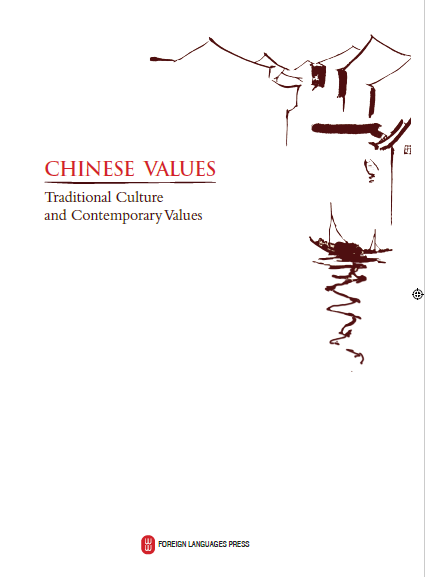By staff reporter ZHOU LIN
Chinese Values: Traditional Culture and Contemporary Values
Author: Cao Yaxin Paperback, 192 pages
Published by Foreign Languages Press
IN China, there are 12 core socialist values that Chinese cherish most; they are prosperity, democracy, civility, harmony, freedom, equality, justice, rule of law, patriotism, dedication, integrity, and friendship. But what do these values mean and how can we understand them? We recommend the book Chinese Values: Traditional Culture and Contemporary Values written by Cao Yaxin, a young cultural scholar and the executive deputy secretary-general of the Chinese Cultural Institute of Internet Communication.
In recent years, guoxue, meaning national learning or the study of Chinese culture, has become a popular word. The book introduces each of the 12 core socialist values using detailed scenarios to explain Chinese traditional culture and its contemporary value. With plenty of illustrations, each of the 12 chapters combs through the history of Chinese classics and dives into the cultural origin of each value.
In the preface, the author clearly defines guoxue, which focuses on the indigenous culture of China, as opposed to xixue, or Western learning. Guoxue is a systematic study using two perspectives – a horizontal one involving inter-cultural analysis and a vertical one that goes back through history, comparing the ancient with the contemporary and the classical with the popular. Traditional culture is referred to that prior to the New Culture Movement (1910s-1920s), which heralded the modern era in China. In this sense, guoxue is both a concept of differentiation and a concept of time. Its content is limited to the best of traditional Chinese culture, which is congruent with universal values and still has relevance with today’s world.
The author then cites a conversation between Confucius (551-479 BC) and his disciple Ran You, which reveals a rule of social development that is self-evident in the course of Chinese history: The rise of any nation follows the order – the country becomes strong, its people become rich, and its culture and education thrive. National strength is a necessary condition for stability in domestic politics and peace among the people. Economic development can further improve people’s lives. And thriving culture and education can cultivate more knowledgeable and responsible citizens, and boost social ethics.
In the first chapter, the author introduces the foremost socialist core value concerning the nation – prosperity, referring to both wealthy citizens and a strong nation. In Chinese classics, Mencius (372-289 BC) said that sufficient food and clothes were a fundamental benchmark of affluence. Centuries later, in his Tao Hua Yuan Ji (The Story of Peach Blossom Valley), Tao Yuanming (365-427), a Chinese poet, wrote about a utopia – a land of peace where people never worried about food or clothing. Adequate food and clothing is a necessary but superficial aspect of an affluent life. A higher demand of prosperity is one for cultural richness and spiritual wealth. Mencius believed that people who learned about and understand etiquette, benevolence, and righteousness through education are a better symbol of an affluent country.
The author further points out that if national wealth consists of economic and cultural wealth, national strength is similar, encompassing both political and military strength. In Chinese history, the long-lived and prosperous dynasties were without exception united, with vast territories and peaceful coexistence of all ethnic groups. They include the Han (206 BC - AD 220), Tang (618-907), Ming (1368-1644), and Qing (1644-1911) dynasties. When national solidarity is achieved, the country can reach out to build its international influence. The ancient Chinese argued the prospect of “one world, one family” in which people can complement and collaborate with each other. By building on its strength, China means to win mutual respect and aims to contribute to the rest of the world. So, in traditional Chinese culture, a nation of prosperity is expected to have a prosperous economy, thriving culture, political unity, and a sound military system.
The author also divides all these 12 values into three categories: the first four concern the nation, the next four are quests of the collective society, and the rest concern individual citizens.
The second core socialist value concerning the nation is democracy, which has a three-dimensional meaning: people first, rule for the people, and rule by the people. To introduce the third value civility, the author makes a comparison between civilization and civility since they are the same word in the Chinese language – wenming, but used differently in different contexts. Both Chinese civilization and modern civilization are narrated to give a full picture of civility. Harmony is a central idea of traditional Chinese culture, which includes five aspects: the culture of harmony, physical and mental harmony, social harmony, harmony between man and nature, and universal harmony.
Freedom, equality, justice, and rule of law are the core socialist values concerning the whole of society. Patriotism, dedication, integrity, and friendship are values at the level of individual citizens.
The 12 values not only have their roots in Chinese history and culture, but also respond to the call of the present time, with a vision for the future. As President Xi Jinping noted, without the continuation and development of civilization or the promotion and prosperity of culture, the Chinese Dream will not come true.
